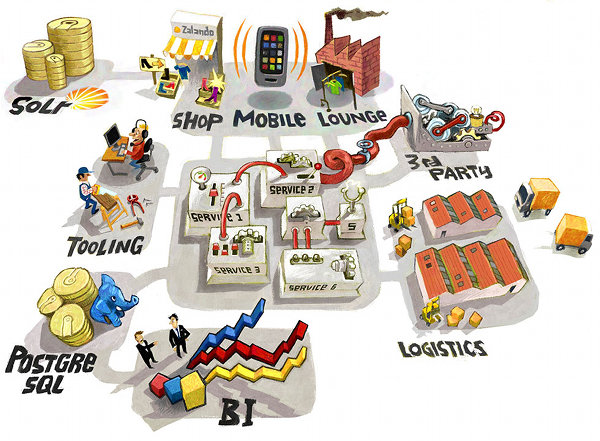Amazon.com is well known for creating custom software for their platform due to scale. Millions of products, transactions and real time pricing and data that is used by Amazon internally ensured that off the shelf software would be totally inadequate. I for one, can only imagine that petabytes of data is consumed in Seattle.
Generally, technology companies like to keep the opposition guessing. What is under the hood and successful is not shared with the public. Yes, legal will most probably have a heart attack if you share technologies used. Employment contracts ensures that Intellectual Property is protected to the T and any disclosure could lead to immediate termination.
However, Zalando (the fashion business inside the Rocket Internet Empire) thought they would share their technology by means of an Infographic. To be clear, it provides an idea of the technologies used by the Zalando technology team.
Big Sales need Big Software. Discover Zalando’s E-Commerce Platform.
While Zalando is well-known for it’s massive and unique growth as a retailer since 2008, little was known about our technical platform yet. Time to give some insights into how Zalando uses technology and mindset to produce and run excellent, fail-safe and scaling E-Commerce APIs and applications for millions of demanding customers.

The entire image can be seen here: Zalando Technology (The image is interactive, so when visiting the Zalando Technology website, expect that every division has a roll over)
Why is this a big deal? Why do you share this kind of information on the same day that investment from J.P. Morgan Asset Management and Quadrant Capital Advisors is announced?
“The company has quickly established itself as a leading online fashion retailer in Europe. We are impressed with Zalando’s large, growing, and loyal customer base as well as the breadth of products offered on the company’s eCommerce platform. Zalando’s world-class fulfillment resources and dedication to superior customer service should enable the company to expand upon its leading market position.”
I would think that you keep as much of this inhouse to ensure that you retain the competitive advantage of the technologies used..
Hat Tip to Exciting Commerce for the highlighting this information on Zalando.

